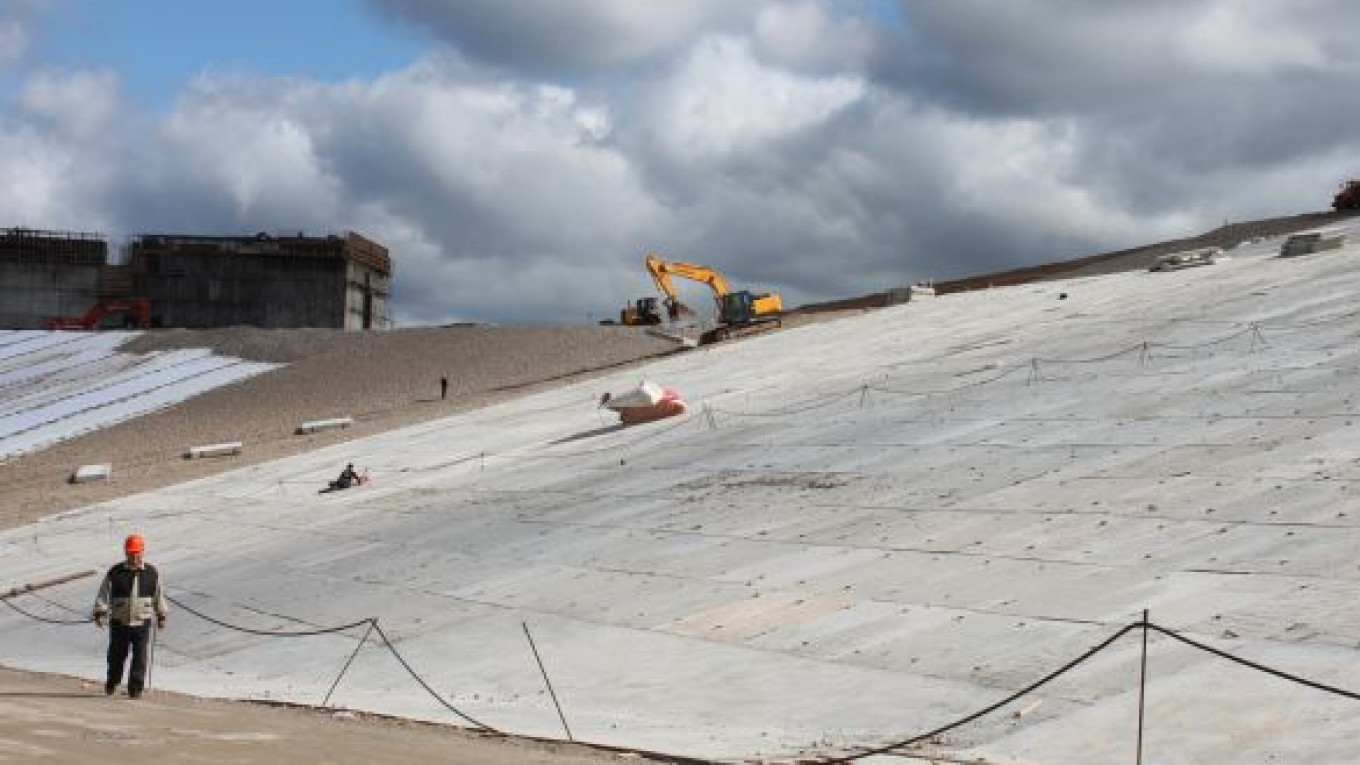BOGORODSKOYE, Moscow Region — Trucks will move almost as much earth for a project here as was excavated to build the Suez Canal.
One of the country's biggest construction projects, a $2.2 billion RusHydro power station that requires two huge artificial lakes, is under way north of Moscow just two hours by car.
The effort to build Phase Two of the Zagorskaya Pumped-Storage Power Plant will include the moving of 60 million cubic meters of earth, said the plant's director, Vladimir Magruk.
"The amount of earth-moving work is astounding," he said.
The builders of the Suez Canal removed 75 million cubic meters of earth.
The digging and embanking impressed Thomas Trone, the former chief of John Deere's construction equipment division in Russia, so much that he described it as 'the largest earth-moving project I have ever seen in my life" in an interview with The Moscow Times in May.
"This is a lot," Alexander Salkov, production director at billionaire Oleg Deripaska's construction company, Inzhtransstroi, said about the earth being moved. "It's huge and serious work."
The company moved the same amount of earth while building a 400-kilometer railroad in Yakutia, he said.
Like the existing Phase One of the station, the second phase will generate clean electricity by flushing water from a higher reservoir lake through turbines to a lower lake.
During off-peak hours, between 11 p.m. and 7 a.m., pumps will transfer the water back up, taking advantage of the lower price for electricity at that time.
The water will come from the Kunya River, as it does for the station's Phase One artificial lakes.
Bright-yellow Volvo dump trucks whirred busily as they crawled up and down the pit of the lower reservoir last week. Hyundais and Caterpillars heartlessly sank their shovels into the wet brown soil as trees and grass showed their green not far off, where the machines had yet to reach.
A couple of workers huddled on one of the future giant conduits between the reservoirs, attaching a rig that would fix the cement on its round side.
The higher lake sits 100 meters above the lower one, about as much of an elevation differential as can be achieved in the Moscow region's landscape of low hills and valleys.
These may not be the perfect conditions for building pumped-storage power plants, whose efficiency increases with the greater elevation of the higher lake. At the same time, Moscow and its environs are the country's most populous area, with the biggest need for this type of flexible electricity supply.
Such plants are widely used in the rest of the world to cover peaks in demand during the daytime and to conserve energy at night. And demand fluctuations are especially sharp in and around Moscow.
The construction would require less earth-moving if it weren't for the soft and porous nature of the ground, Magruk said. A retaining embankment made of this type of soil has to be thicker than usual to hold water.
Zagorskaya's first phase went into operation in the beginning of last decade. The massive Moscow blackout in May 2005, caused by a meltdown of the Chagino substation, was one of the things that prompted construction of the plant's second phase to make supply more stable at peak hours, Magruk said.
Russia has just one other pumped-storage power plant, a tiny one in the south of the country. There are more than 400 of these plants worldwide, and a number of them are in Switzerland and Britain.
Although plants of this type smooth out fluctuations in demand for electricity generated elsewhere, due to the complexities of buying and selling power on the grid the utility needs to charge a price that's above the market to earn a profit.
Magruk said the government should allow special pricing conditions for the stations to encourage further investment in this segment.
Related articles:
A Message from The Moscow Times:
Dear readers,
We are facing unprecedented challenges. Russia's Prosecutor General's Office has designated The Moscow Times as an "undesirable" organization, criminalizing our work and putting our staff at risk of prosecution. This follows our earlier unjust labeling as a "foreign agent."
These actions are direct attempts to silence independent journalism in Russia. The authorities claim our work "discredits the decisions of the Russian leadership." We see things differently: we strive to provide accurate, unbiased reporting on Russia.
We, the journalists of The Moscow Times, refuse to be silenced. But to continue our work, we need your help.
Your support, no matter how small, makes a world of difference. If you can, please support us monthly starting from just $2. It's quick to set up, and every contribution makes a significant impact.
By supporting The Moscow Times, you're defending open, independent journalism in the face of repression. Thank you for standing with us.
Remind me later.


